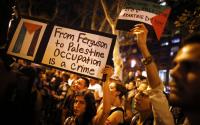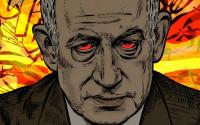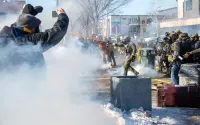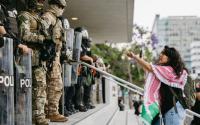24 January 2006Ian Herbert
The sanitised images of war broadcast on television are a "lethal weapon" masking atrocities which demonstrate that conflict can "never be justified," an Independent debate was told last night.
"War is not about victory or defeat. It is about the total failure of human spirit," Robert Fisk, The Independent's Middle East correspondent, told the debate. "When you see the things I see, you would never support war ever again."
The increasingly chaotic conflict in Iraq is utterly unjustifiable and a by-product of the same Western thirst for "control, control, control" of the Middle East's assets and resources that has been evident for centuries, added Fisk. "We've always gone to the Middle East to 'liberate' people, taking with us our guns and our swords, our horses and our helicopters," he said.
Fisk, whose new book The Great War for Civilisation: The Conquest of the Middle East has been published by Fourth Estate, said there could be no lasting settlement in Iraq for as long as the occupiers remained there.
He presented a powerful case for presenting in the media the full horror of war - images such as the blood that poured over the top of his shoes in a Baghdad hospital, and the bones he saw where should have been feet on the legs of a child - a horrific sight which was edited out in newspaper images of the child.
"One thing that unsettles people is the sense that there is a slightly voyeuristic element to seeing people suffering," suggested Simon Kelner, The Independent's editor-in-chief, who chaired the debate. Fisk replied that film-makers saw fit to include the full gore of war in productions such as Saving Private Ryan and there was no reason why news broadcasts should be any different. Most of the 600-strong audience at Manchester Town Hall agreed when the issue was put to the vote.
Fisk, who has covered the Middle East for The Independent for 19 years, described the difficulties of covering the current anarchy in Iraq. "Can we do any more than put together the little tiny pieces?" he asked. "Sometimes I think what we see of the Iraqi war is what we see on the roof of a Renaissance cathedral after a massive earthquake in northern Italy; little tiny bits of colour, and we try to string them together to make sense."
Called to one atrocity, he managed to take a picture of a baby on fire and spend 20 seconds with an eyewitness before 40 Iraqis were "beating like fury on the roof of the car" and he left. "Mouse reporting, they call it. Many of us are asking, 'Are the risks worth it?'" he said.
Those reporters who must settle for "hotel journalism", reporting from their hotel rooms because "there are armed men to protect them, who tell them they can't leave," owed it to their readers to say as much.
Fisk was asked how he preserved his sanity over 30 years covering the Middle East. "You have to tell yourself that you don't come here to die, you come here to report," he said. "It is becoming increasingly difficult to justify risking one's life [while sometimes feeling you are not] having an effect. I sometimes wonder if I should have chosen something safer and different and maybe happier, and I wonder if my 30 years in the Middle East wasn't a curse. Well, if so, my book is the story of that curse."






